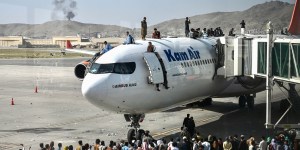Lenten Campaign 2025
This content is free of charge, as are all our articles.
Support us with a donation that is tax-deductible and enable us to continue to reach millions of readers.
Concerns are growing for the tiny community of Christians in Afghanistan, who might face forced conversion to Islam or death as the Taliban drills down on the details of who is now living under their regime.
Thousands of Afghans continued to try to escape from the country since the Taliban's August 15 takeover of Kabul, the capital. Though Taliban spokesmen at first tried to reassure the West that it would be an "inclusive" government, their track record -- and reports now leaking out of severe repression -- do not give Western observers hope.
Thomas Heine-Geldern, executive president of Aid to the Church in Need (ACN), said this week that when the Taliban last ruled the country, from 1996 to 2001, it imposed a strict version of Sharia law.
"We can expect that Sunni Islam will be the official religion, that Sharia law will be reimposed, and that hard-won respect for human rights, including a relative measure of religious freedom during the last 20 years will be revoked," Heine-Geldern said in a statement.
Estimates of the number of Christians in Afghanistan vary from a high of 20,000 to possibly as low as 1,000. Getting accurate numbers is difficult, as so many Christians live their lives of faith in secret.
ACN pointed out that in 2010, in territory that it controlled, the Taliban killed 10 humanitarian workers, who had been accused of spreading Christianity and being foreign spies.
"Reportedly, some leaders of underground house churches have received letters from Taliban that they are being watched," the papal charity said. "There is concern that Christians may be killed outright and that young Christian girls will be given in marriage to Taliban fighters. Even before the Taliban takeover, Christian converts from Islam faced ostracization and even violence from family members. As of August 16, two Indian Jesuits and four Missionaries of Charity were awaiting evacuation. Supporting Afghanistan’s Christians in practical ways will be extremely difficult — and prayer will be especially important."
Several Christians told the website ReligionUnplugged that the lives of Christians have suddenly become more threatened.
A 21-year-old man that ReligionUnplugged called Jalal said that neighbors told him that the Taliban has begun going door to door, asking who is Christian. Jalal and his wife converted to Christianity secretly.
“They will kill me. They are checking every home,” he said.
"ReligionUnplugged could not confirm whether or not the Taliban has executed anyone on these particular reported home visits, but two other sources report similar sightings of Taliban home visits and say they have asked pointedly religious questions," the website said on Friday. It continued:
Of particular concern is the Christian-run Pro Bambini di Kabul (For the Children of Kabul) school in the nation's capital city. The two Catholic sisters there said last month that they planned to stay, even if the Taliban took over. According to an August 17 statement from the Rome-based head of the foundation overseeing the school, the sisters are safe, but the foundation has not yet responded to a request for more information on Friday.
“We are in constant contact with the sisters present there and we pray for them. I can tell you that they are fine and that all channels have been activated so that they are safe,” Fr. Matteo Sanavio told Catholic News Agency on Tuesday.
The president of the association asked people to pray “so that all Christians present in Kabul may find salvation and, together with them, the poor and tortured Afghan people will soon be able to have a future of peace.”
Meanwhile, the U.S. troop pullout from Afghanistan has been widely criticized around the world, and in Iraq it is giving Christians pause.
The whole chain of events reminded many Iraqis of the "tragic fate of Mosul in the summer of 2014," when Iraq's second-largest city was seized by the Islamic State group, Chaldean Bishop-elect Paul Thabit Mekko of Alqosh told AsiaNews.
"Many fear that, should the international coalition (U.S. troops in particular) leave, Iraq’s regular army might break up and the country fall into the hands of extremist groups. The latter are still active and responsible for attacks against civilians," Bishop Mekko said. “Lately, there have been rumors about a possible withdrawal of U.S. troops. This if fuelling fear and concern in people because what happened in Afghanistan could happen here if they suddenly leave.”
It's not a far-fetched fear, said Mekko, who currently oversees the Christian community in Karamles on the Nineveh Plain. He said that “now and then, attacks are reported in cities and against sensitive targets," including local U.S. bases. “The Islamic State is behind them, or forces (militias and paramilitary groups) who are interested in sowing confusion.”
The “mindset that will rule in Kabul” is cause for concern, he said. The Taliban’s worldview is “similar to that of the Islamic State, of dark and gloomy domination.”












